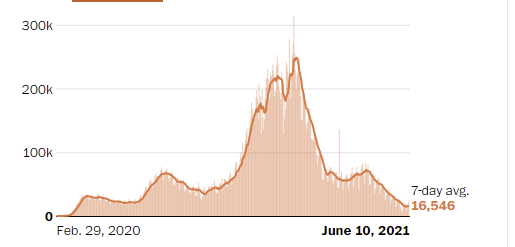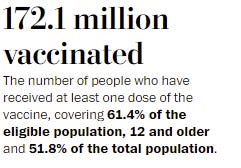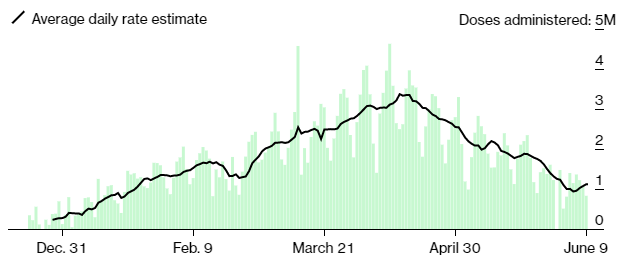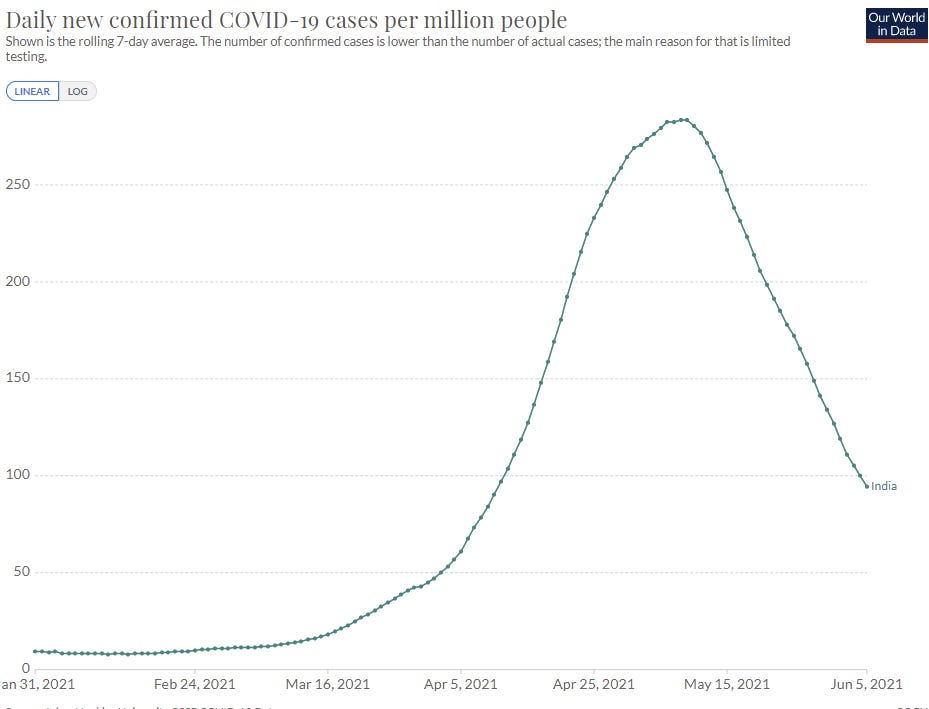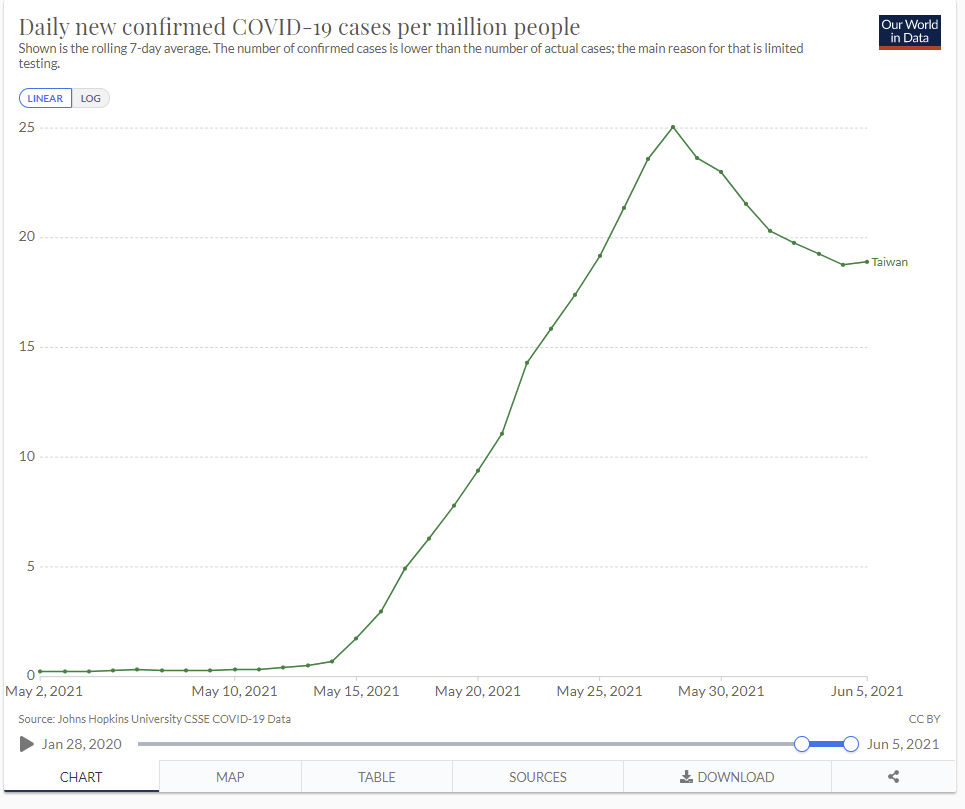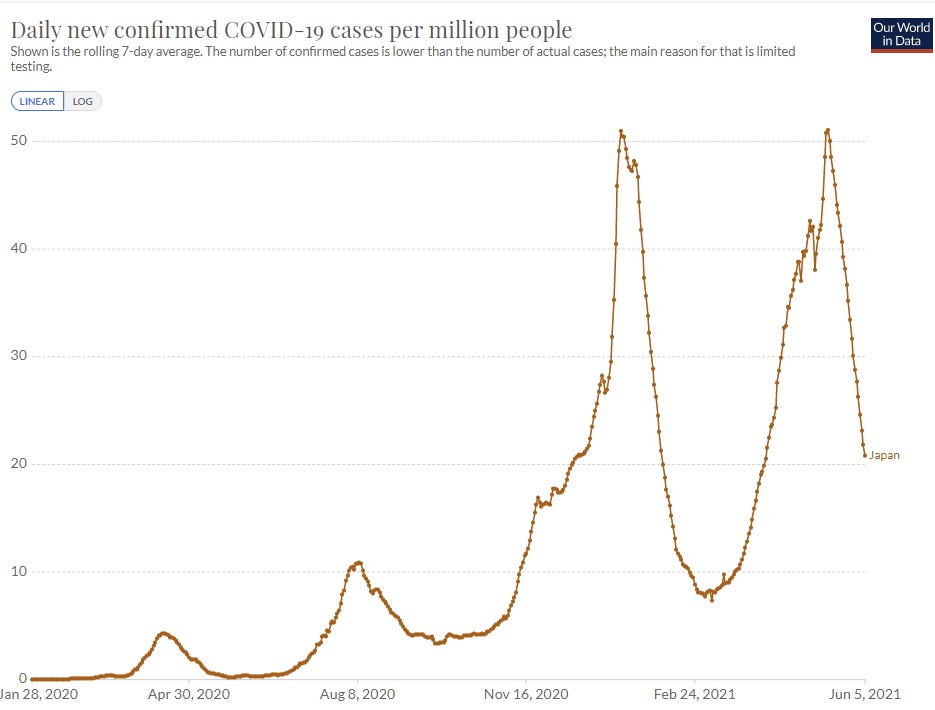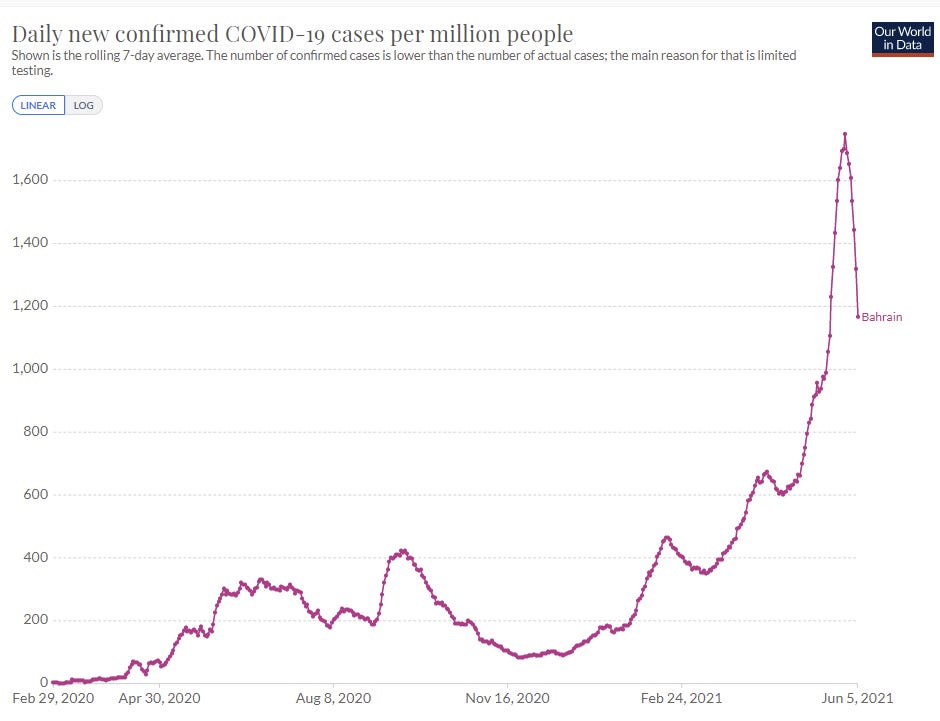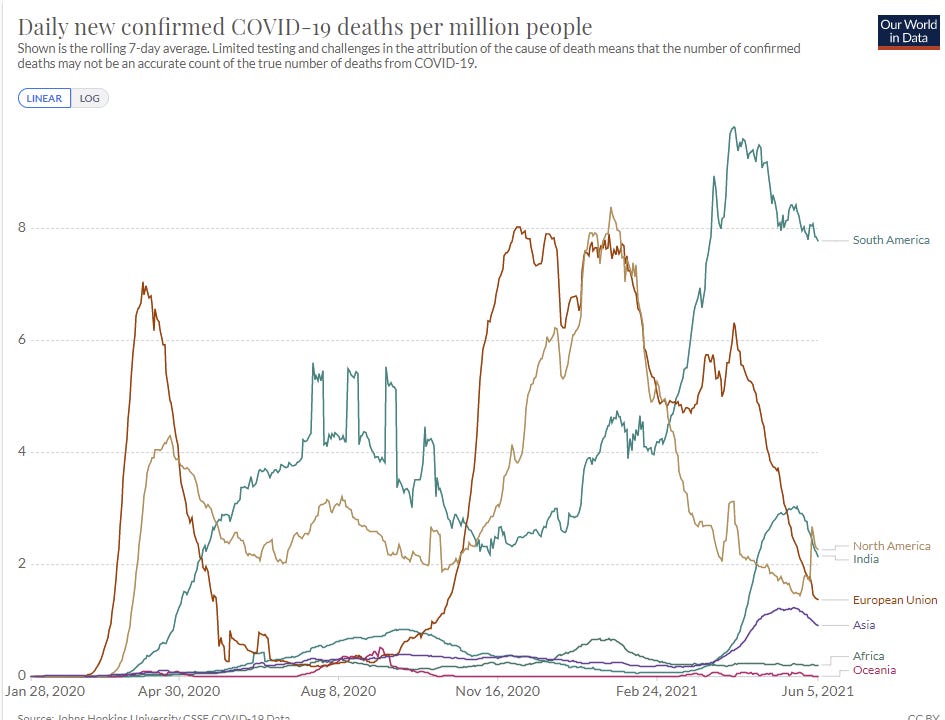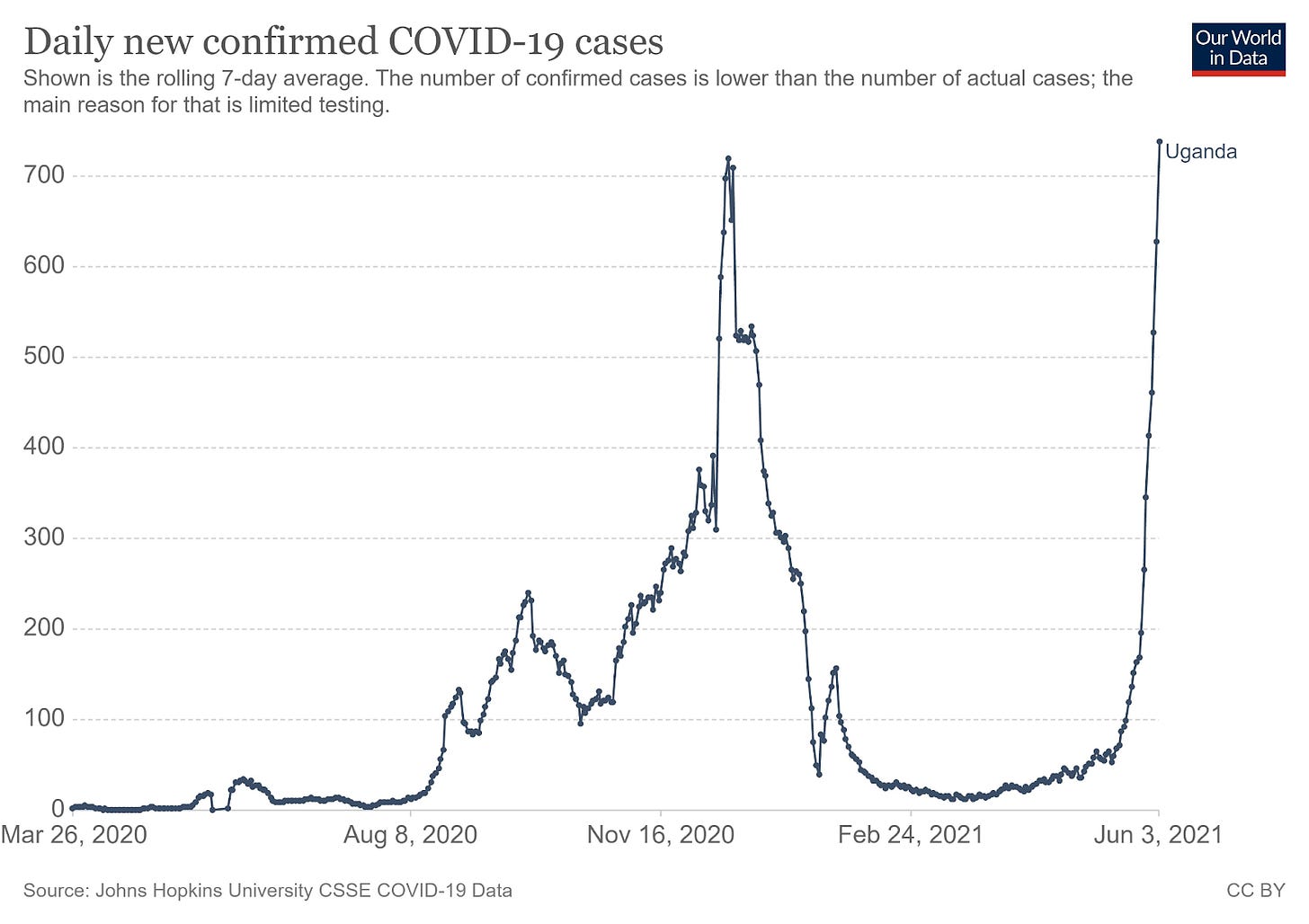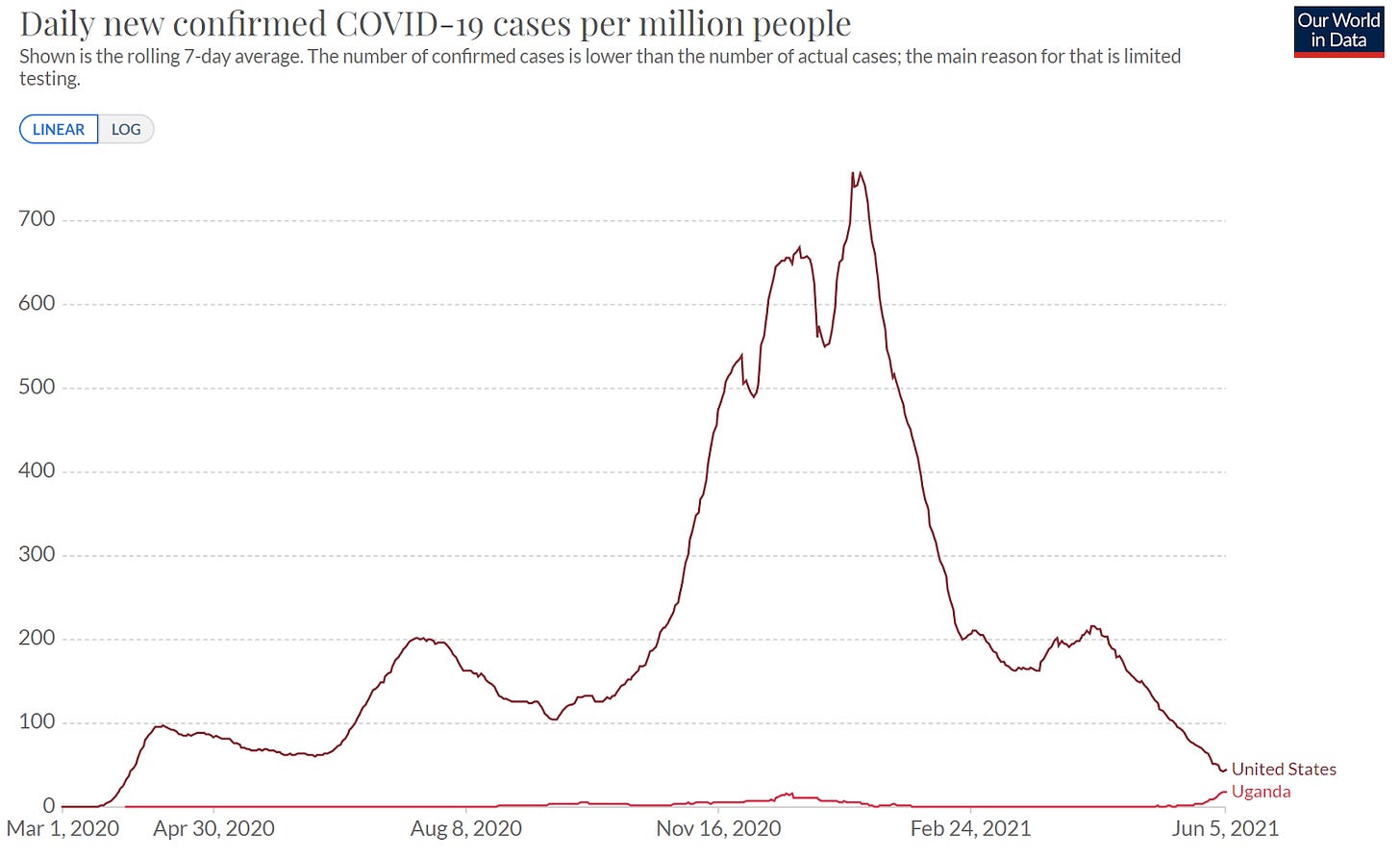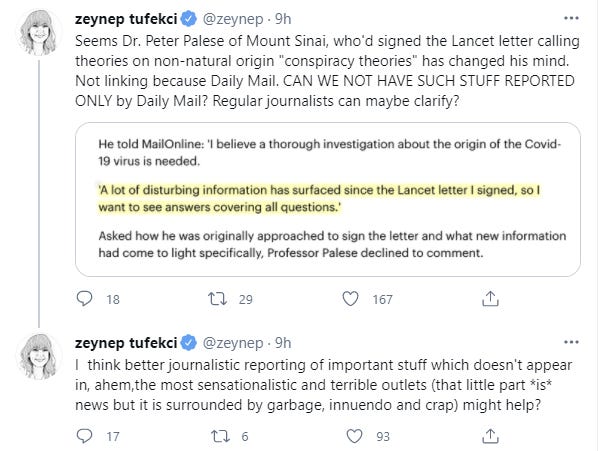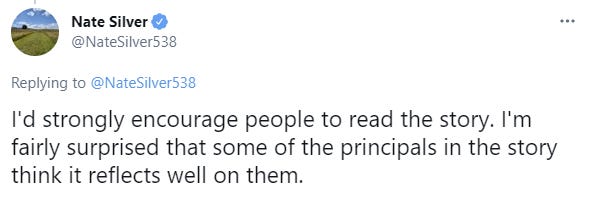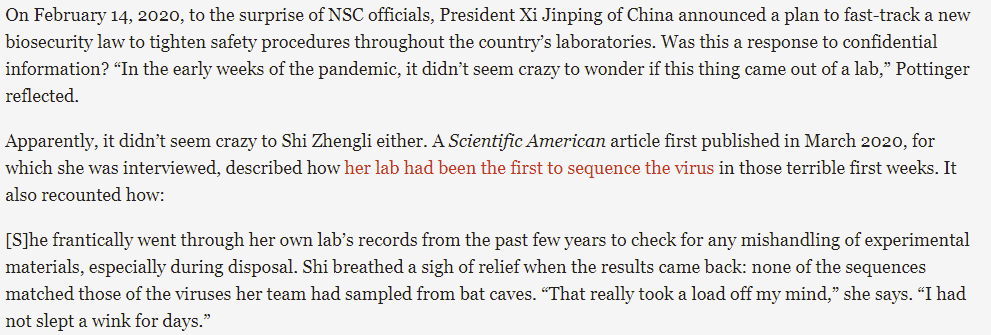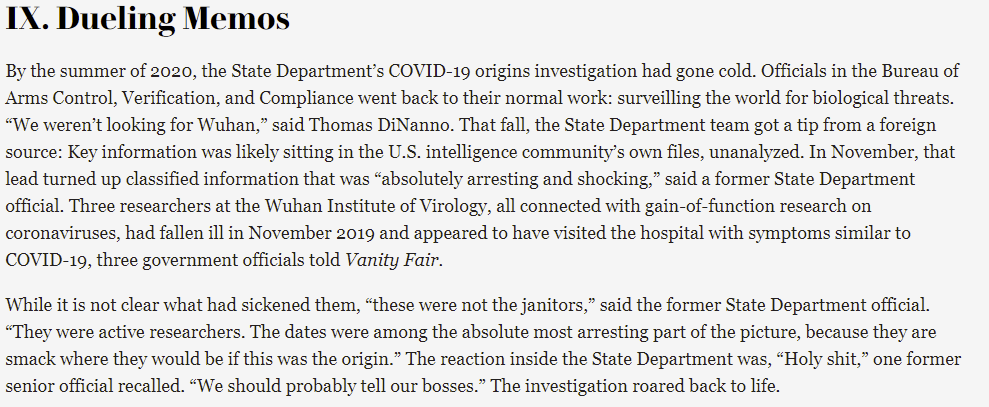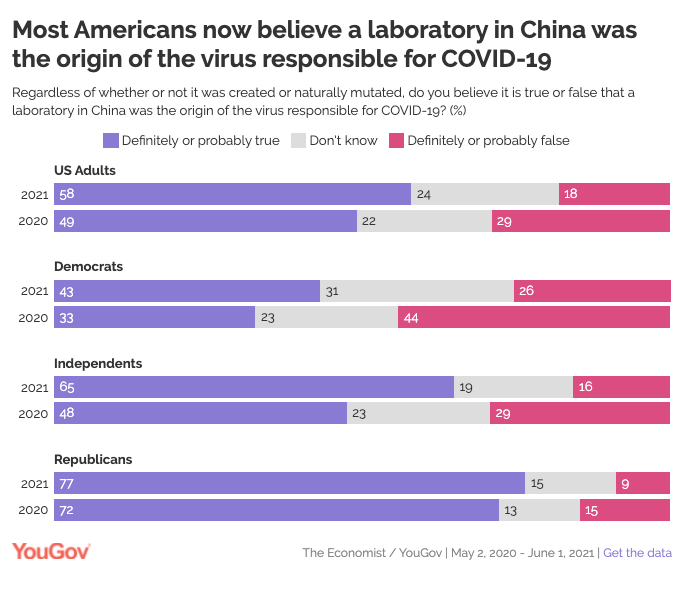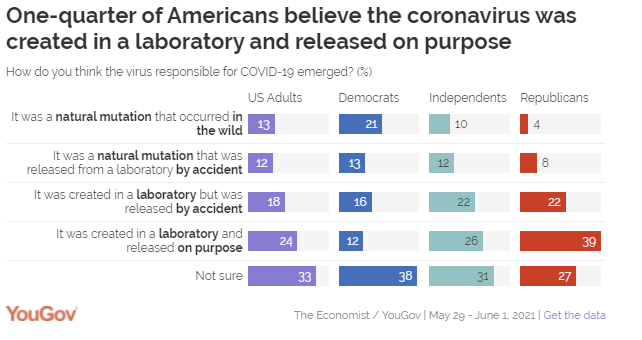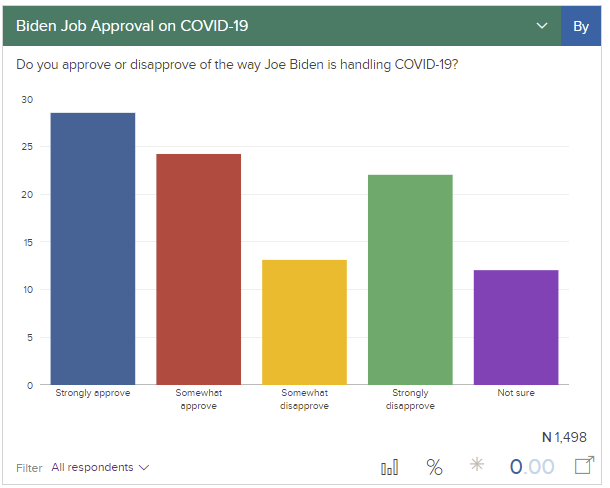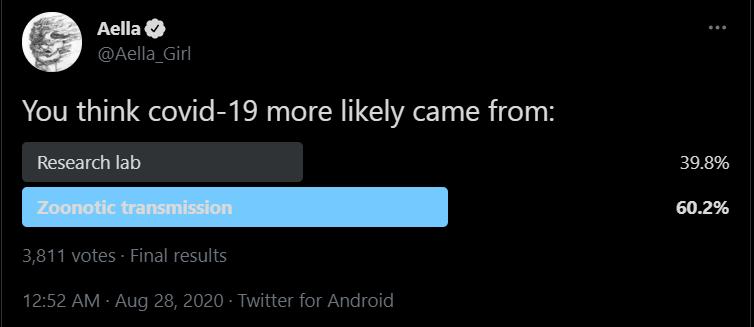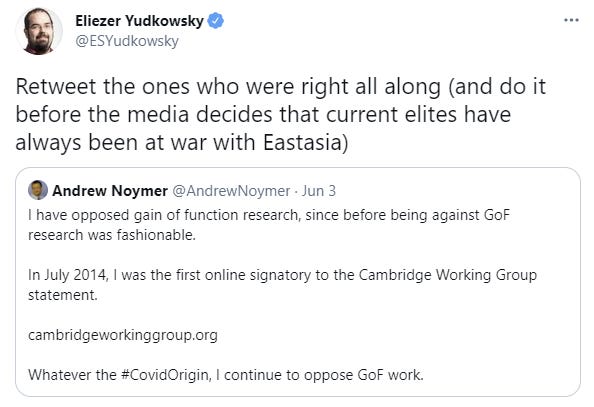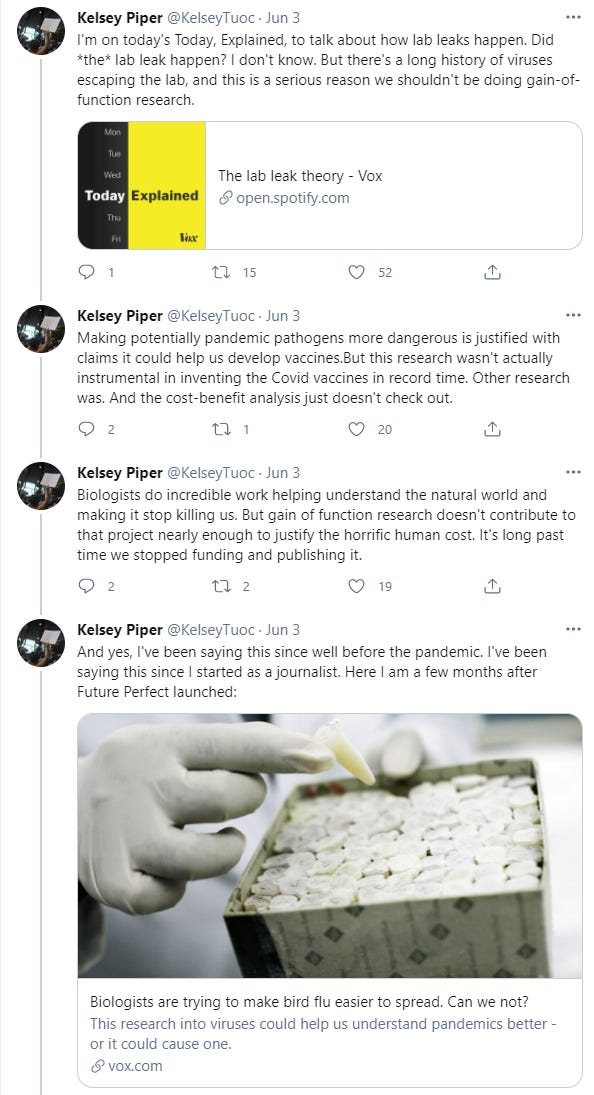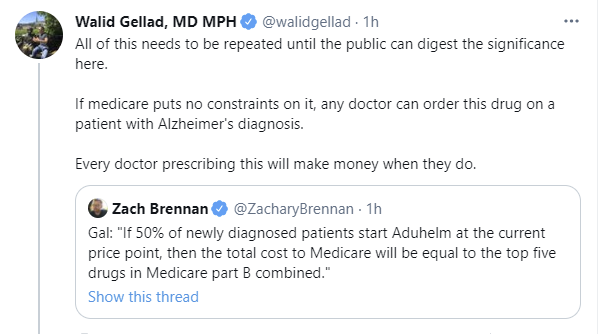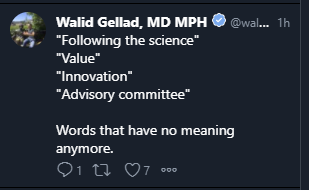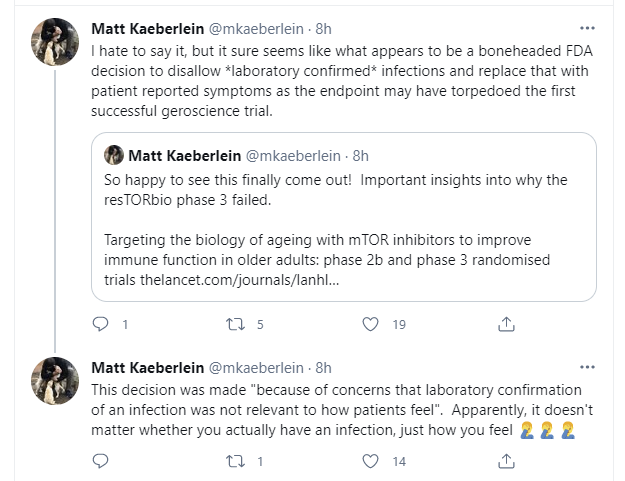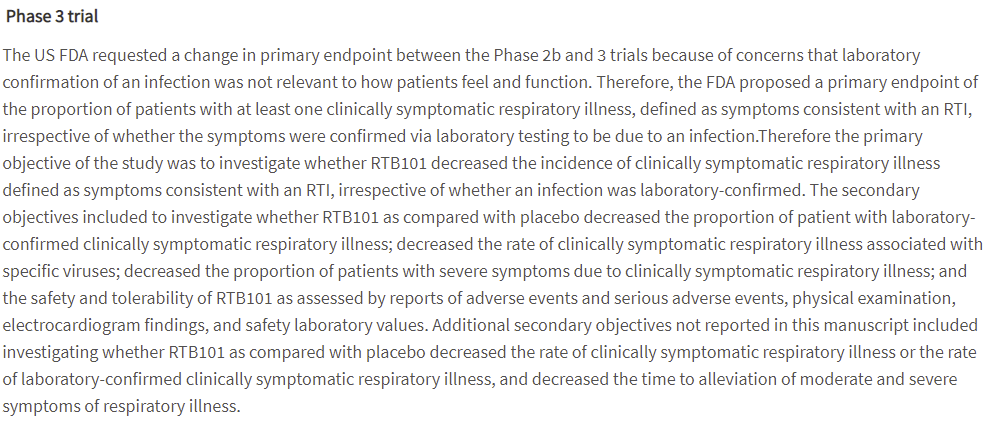Covid 6/10: Somebody Else's Problem
Logistics note: This week’s post includes some non-time-sensitive items from last week, including much of the section on the lab leak hypothesis, as my available time last week was limited. Also, I’ll be in NYC from 6/11 until 6/16, so if you’d like to chat, let me know - I promise asking will cost you at most zero points.
Covid-19 is not quite done with the United States of America. The Indian variant (“Delta”) delivering a ‘one last scare’ moment is plausible. But unless there’s a new variant that can escape from the mRNA vaccines and we are unable to respond rapidly enough, a possibility I now put at most at 10%, Covid-19 is mostly done with the United States of America.
There are essentially three things left.
Live life. There’s the question of how we can safely transition back to a normal life here in the good old USA, and what that new normal life will look like. This includes how worried we should be about potential future strains or issues of seasonality.
Rest of the world. Covid-19 is probably mostly done with the USA. Other countries without our vaccine access are not so fortunate. It is quite plausible that the majority of deaths from Covid-19 are in the future rather than the past.
Postmortem. There’s the question of how we can learn from what happened. We need to adjust our models of the world, and what methods we can use to make sense of it or change it for the better. We also specifically need to do what we can to deal properly with the next pandemic or other crisis. Thus questions like the origins of the virus and what to do about what seems like the absurdly terrible idea that is Gain of Function research.
It is easy to view almost all of this as Somebody Else’s Problem. One could say, I’m vaccinated and can go live life, give or take a few medium-term mask requirements. If someone else in America isn’t vaccinated, one can decide they made a choice. We can leave others to prepare for the next pandemic and go back to not caring much about what is happening overseas.
Or, if to one’s credit one wants to be or remain in the habit of caring about somebody else’s problems, one can balance such cares between all the various problems we have. There are a lot of problems out there. I do think the Covid-19 endgame, and how many people will end up vaccinated versus infected, is still for now sufficiently up in the air and still looms large enough to deserve attention. For better or worse, that might not remain true much longer.
Let’s run the numbers.
Predictions
Prediction from last week: Positivity rate of 1.8% (down 0.3%), deaths fall by 12%.
Results: Positivity rate of 2.0% (down 0.1%), deaths fall by 4%.
Prediction for next week: Positivity rate of 1.8% (down 0.2%), deaths fall by 9%.
Both numbers this week were disappointing. That happens more often than it ‘should’ given that deaths represent past cases. I expect the trends to mostly resume, but still one must adjust the expected future path a bit. There is a small chance this week’s numbers were outliers and we’ll see larger-than-normal drops next week. That’s also happened a few times.
Deaths
DateWESTMIDWESTSOUTHNORTHEASTTOTALApr 22-Apr 287521173160911104644Apr 29-May 5943122014409714574May 6-May 12826106913928554142May 13-May 19592119412778113874May 20-May 2661594812796313473May 27-June 252783811704562991June 3-June 97208179154312883
Disappointing progress, but mostly still progress. The rise in the West comes from California. I doubt it is ‘real’ but it does not seem to strictly be a backlog situation, so I don’t think it can be adjusted, any more than the South’s number is too low. I’m not convinced we got ‘ahead of ourselves’ the last few weeks given the drops in case numbers, and I expect deaths to continue dropping.
Cases
DateWESTMIDWESTSOUTHNORTHEASTApr 29-May 552,98478,77885,64168,299285,702May 6-May 1246,04559,94570,74046,782223,512May 13-May 1939,60145,03063,52934,309182,469May 20-May 2633,89034,69448,97324,849142,406May 27-June 231,17220,04433,29314,66099,169June 3-June 925,98718,26732,54511,54088,339
Total numbers (from WaPo) to put it all in easier-to-see perspective:
Those are disappointing numbers, with “only” an 11% drop in cases, indicating that it is likely we did get ahead of ourselves a bit last week. The Delta variant is still only 6% of cases, so it doesn’t yet explain the change. Presumably some of this is the continued lifting of restrictions, both officially and unofficially.
Vaccinations
The recent vaccination stats are very good news. Previously, we had seen a very clear mostly-constant upward slope until early April, followed by a mostly-constant downward slope until the beginning of June. A sensible projection was that this trend would continue. Instead, we have a very hopeful upward trend. Alas, it is likely that this upward trend is mostly second doses rather than first doses, so it is likely this won't be sustained.
If we can sustain even this level of vaccinations going forward, there’s little to worry about. Progress will be slower than we might like, but progress is progress, and we will get there. Mostly, vaccination efforts now shift to overseas, where there is a lack of supply.
Delta (Indian) Variant in the USA
Washington Post reports that it is 6% of new cases. This was so inevitable I haven’t even belabored the point. There’s a more infectious strain, so it’s going to eventually displace the old one. That’s how it works. If this causes cases to go up again for the ‘one last scare’ you get at the end of a horror movie, we will find out in about a month.
Warning about the danger, Fauci called for more vaccinations, using this logic:
Other things we cannot let happen include death and also taxes. I can guess what Fauci is attempting to convey here, and I know what he is attempting to accomplish, but there is no set of possible (let alone plausible) actions that will prevent Delta from ‘taking over’ what is left of the pandemic in America, or anywhere else. That’s not how this works.
Living Life
(This assumes you’re vaccinated. If you’re not and you can be, go take care of that, I’ll wait. If you’re overseas and can’t, this doesn’t apply to you yet, and I’m sorry.)
You may not have had Covid-19, but the virus has still been living rent free in your head for over a year. Kick it out.
It is important to live and embrace life. It’s your life, and (pending heroic efforts to the contrary) it’s ending one minute at a time. If you’re vaccinated and in a place with the virus under control, go out there and live yours!
That does not mean going back to your old life, if that’s not the life you want.
This is the time to take stock. Figure out where you want to live, what you want to do with your life and who you want by your side when you do it. Do things that matter, and things that bring you joy. Go on a trip, see the world, start a business, fall in love, start a family, go out and talk to people in person. And other neat stuff like that.
You’ll be asked to wear masks for a while. If you’re asked, wear them. It’s fine.
If you are asked for much more than that, take your business and your life elsewhere.
That’s all there is to it. That does not mean forgetting what happened, or that it’s not important to learn from the experience and update our models, actions and precautions. It also doesn’t mean dismissing the situation overseas as a pure Someone Else’s Problem, or that keeping an eye on things every so often isn’t prudent - so long as it stops screwing up your life.
Rest of the World
Control systems are powerful. Before I fully understood this, it seemed suspicious that Covid-19 was in a nightmarish range of virulence and lethality. Under that theory, if Covid-19 had been more virulent it would have been impossible to stop and we’d have all gotten it and moved on, if it had been less lethal we would have chosen not to stop it, and if it had been less virulent or more lethal we would have stopped it. So under this model, there weren’t that many configurations of (virulence, lethality) that would be worse than what we got unless both variables were much higher.
With a better appreciation for control systems, it is now clear that the range of configurations that result in ‘we adjust to remain stuck in limbo for a year’ was remarkably large. There were a lot of knobs humans could turn to contain things, and they could do so at different prevalence levels based on lethality. It would take quite a lot to fully break that equilibrium in either direction, and that did not happen until the vaccines showed up.
In the meantime, the vaccines are holding strong, but with the current Indian ‘delta’ strain the virus has become quite a bit more virulent and quite a bit more lethal, and any given nation’s ability to sustain countermeasures only lasts so long. Will control systems increasingly break in the other direction, with results far more disastrous than was possible earlier?
The numbers for the new variant are increases on top of increases for the English strain that inspired my claim that We’re Fucked, It’s Over. I am very happy that we outperformed the math on vaccinations, and that combined with the various warnings from lots of people collectively were a sufficiently self-preventing prophecy that it was not, in fact, over. It was closer than it looked, but we got there mostly in time, and instead of a huge final wave we saw a brief blip.
If we’d had to deal with another similar ramp up in virulence on top of that? We had moves left we could have used, such as fractional dosing, first doses first, approving additional vaccinations, finally rolling out rapid testing properly and shifting focus further to ventilation and away from surfaces, along with some amount of additional restrictions and marginal citizen behavioral adjustments. There’s some chance we wouldn’t have fully lost. But there’s (almost) no way we would have almost fully held the line like we did.
One counterargument is India.
It was a shockingly rapid hockey stick graph. It looked like India was potentially headed straight for full herd immunity. The hospital system broke down. Oxygen ran out. It was a disaster that looked like it would only get worse.
Then the curve turned around, and cases started declining again.
Thus, we have curves such as (one country per graph because scales are so different):
India:
Taiwan:
Japan:
Bahrain:
Then combine that with the levels for third world countries having previously stabilized at relatively low numbers. Conditions in India got quite bad, but that was largely a reflection of its lack of public health resources. Here’s the world, to scale:
And that same graph with deaths instead of cases:
India peaked substantially lower than North America or the European Union, and was barely higher than South America at the time. Yet it quickly reversed its trend, which I completely did not expect. If you think you could have predicted most or all of those last two graphs, I don’t believe you. If you can explain most of it in hindsight, that's still a super hard problem.
Some areas have so far managed to completely contain Covid-19 via lockdowns. That’s a super scary position to be in, with no immunity built up. What would happen at this point if there was a serious outbreak in China? With China’s vaccine not looking that good at preventing spread, it is probable China’s only option would be an extremely hard lockdown and hoping it was good enough. Australia’s vaccinations have been slow enough for a similar pickle.
South America is quietly in a terrible situation, and that’s where we need to be rushing our vaccine doses at this point rather than India, provided they have the ability to distribute them.
I’m less worried about other areas like Africa, because their control systems should have a lot of slack left given what we’ve seen so far. That doesn’t mean something like this isn’t scary:
...but keep in mind, also, this graph, and remember what happened in India:
Our continuing failure to scale up vaccine distribution remains a horrible scandal, but it’s also worth noting that the issues of distribution in many places are very real. Many third world nations got modest allocations of vaccine doses from Covax and proved unable to put those shots into arms. Handing over doses, on its own, will not always be enough, and that’s a problem I haven’t paid enough attention to.
Zeynep cautions us that there is a real chance that the majority of Covid-19 deaths could come after we had the vaccines, or even after we had enough copies. In her Twitter thread, she is even more explicit. Her emphatic demand, that we do everything possible to gather every dose we can of any vaccine, and vaccinate as many people around the world as fast as possible, is clear and overdetermined, and we should absolutely do that.
This is by far the most important remaining issue: Getting vaccines, any vaccines, out to as many people as possible, as fast as possible, until we’ve vaccinated the whole world. Period. Better vaccines (mRNA) are better if we have them and can deliver them, but any vaccine is far better than none.
Where I don’t fully agree is with her warning that otherwise we are likely to see the majority of deaths after we had sufficient vaccine supplies (as opposed to most deaths being after we had the vaccines, which is simply true, because we had the vaccines in two days and could have easily confirmed they were safe and effective within a few weeks after that.) I agree that this is still possible if China loses containment. I do not think it is a favorite, but if I had to put a number on Covid causing 7.5 million confirmed deaths worldwide (roughly double the current level) I’d still put it at 15%, which is much higher than I’d like. However, I disagree that this is increasingly likely, because of the turnaround in India. When Indian cases and deaths were a straight line up, I would have put that probability much higher, at least 25% (but it’s hard to have a good post-hoc measure of what your probability of something was in the past, if you didn’t think about it explicitly at the time). Seeing things there not only stabilize but quickly start improving was very, very good news.
And of course, the faster we finish the job, the less likely we are to face a variant that’s even worse than the Indian one, potentially one that requires a booster shot.
Postmortem
A large percentage of these posts have been focused on postmortem. There is much work of this type left to do, and in particular the topic of the month can no longer be avoided.
It’s time to fully talk about the origins of Covid-19, and the lab leak hypothesis.
I wrote a section about this two weeks ago. To close that section, I said I would do my best to not talk further about the question of Covid’s origin.
My best was nowhere close to good enough. Too much new information has come to light and additional events have occurred, and with that plus time to reflect, it has become clear the implications are important. So here we are.
(Summary of section from last time: I was 40% this was a lab leak of some kind, almost certainly like many other accidental lab leaks that have happened before, which would then have been covered up without need for a broad conspiracy. Press suppressed dissent, and has now been trying to quietly rewrite history. I’d been ignoring it because it seemed like finding out it was a lab leak would make things worse.)
Escape from the Lab
The media’s stance, as far as I can tell, is now to deny that they ever treated the lab leak hypothesis as ‘debunked’ in the first place, while now calling it a ‘conspiracy theory’ and trying to claim it comes from Donald Trump, in order to make it impossible for anyone to be seen taking the hypothesis seriously, and also arguing that the political implications of investigating would be bad so we shouldn’t investigate.
This has successfully kept all reporters who desire to have ‘credibility’ (as opposed to credibility) away from the story, and leads to exasperated reactions like this one:
Nate Silver notes the explicit bury-the-truth-because-politics argument (Link to Nature). I don’t know why Nate is surprised that people think that advocating for something for explicit political reasons think that doing so makes them ‘look good’ in the sense that they care about, given how things work these days.
This is an explicit call for scientists not to say true things or investigate questions, if doing so would be bad for science funding and/or for geopolitics. I do appreciate the explicitness, as does Nate:
Vanity Fair offers an account of what happened. Their story starts in straightforward fashion:
It’s not clear how much The Lancet statement and other accusations of racism mattered, versus what was happening with Tom Cotton’s claims and the distortions of them (which this piece argues was central, and it documents the ways in which what he said was twisted around), versus worries about what Trump might do, versus stories told by defenders of gain of function research like Dr. Fauci or fears that our funding of it could look quite terrible, versus general media information cascades. The suppression of the lab leak hypothesis seems overdetermined.
It’s also not clear how distinct those causes are, as the Lancet letter seems to have been organized and largely signed by those with a vested interest in gain of function research, before it was used as a justification for suppressing dissent on Facebook and elsewhere.
The Vanity Fair story is excellent, but very long. This passage also clarifies the situation:
Even if we take Shi Zhengli at her word, these are not the actions of someone who thinks that a lab leak is not a plausible explanation, or whose view of the safety of her work implies she should be allowed to keep doing it.
Also, there’s this, which certainly feels like strong (although of course in no way conclusive) evidence.
The lab did at least allow for rapid sequencing of the virus, once the problem became clear, which seems completely distinct as an action from any ongoing research that might have been dangerous (including gain of function research):
Even now, places like the Washington Post are trying out various rhetorical ways to suppress and doom dissent, with one recent attempt being to associate it all, once again, with the Bad Orange Man. You see, this is all about ‘distracting’ from ‘Trump failures’ that actual no one (except Trump himself, probably) was still talking about. They warn about the dangers of a ‘false narrative’ of what happened, where all the blame for everything isn’t pinned on Trump, and thus anything that doesn’t do that must be a Trump op. Play into any other narrative, they say, and you’re helping Trump, who cares if your statements are ‘accurate.’ Classic stuff. Play the hits.
So, basically, they started out gaslighting us, then switched to gaslighting us about whether they were previously gaslighting us, while continuing to gaslight us further using different words.
They are also explicitly saying that when the truth conflicts with politics we should bury the truth, with explicit calls to scapegoat anyone who fails to do this.
Which was also the playbook on so many other issues.
Biden is launching an ‘official investigation’ into this, because he had no choice but to do so, but he is doing so by asking the people whose job it is to decide which secret things to keep secret because of ‘national interests.’ When they come back with nothing, I will update very little.
It seems that every day I see new individual data points that look highly suspicious. Some of them have plausible alternative explanations, while others are clearly suspicious people acting suspiciously.
The American people are having none of it (YouGov).
(In other news, I took a poll to see what most people think most means in context, and most of them couldn’t agree on it.)
Not only that, 42% think it was created in the lab, and 24% of Americans think it was both created in the laboratory and then released on purpose, versus only 13% (!) of Americans buying the line that this was a natural mutation that occurred in the wild.
Here it is broken up by education level.
But, of course, it’s not like pursuing this matters that much to people, as judged by Biden’s approval on the issue, which is quite good:
There is a correct answer to the question of Covid’s origins, from the perspective of those answering this survey, and it is: Not Sure. The confidence level that should be required to select something other than Not Sure in such a survey is highly unclear, but I can’t see how (barring having material nonpublic information) one can have sufficient confidence to pick an explanation, at this point. That’s especially true given the lab hypothesis gets split here into three subcategories.
The majority believing the lab leak hypothesis is probably true is new, but there have always been a lot of Americans who believed it, even when it was officially ‘debunked’ and being censored and suppressed across platforms. Here’s two Aella polls, from August 28, 2020 and then recently on May 25, 2021.
This seems like a very reasonable amount of updating on new information.
I’ve left a bunch of stuff out, because I felt it was bringing more heat than light, or there were plausible alternative explanations, or to keep length at a reasonable place. This accounting is nowhere near complete.
The question one must ask is, was all this new information more likely in the worlds where there was a lab leak, versus the worlds where there wasn’t one? Do most of the people involved in this know what happened any more than we do? Or is this all the kind of covering up and automatic suppression of wrongthink that would happen regardless of the underlying facts?
I mean, sure, stuff like this...
...and that’s all true as far as it goes, but we already know China can’t provide better evidence than that or it would have already done so, so none of that is news.
Mike Solana later fleshed out his views more fully here, documenting how deeply messed up the whole discourse around the lab leak hypothesis has been.
This (via MR) thread seems like a reasonable case arguing for a zoonotic origin for Covid-19. I don’t agree with many of its points, especially the framing that a lab leak requires lies upon lies and a very narrow path, but I do still see no strong reason this couldn’t have been zoonotic.
Thus, I’m not changing my probability all that much. I’m now at something like 55%, up from 40%, now that I see more about how this all went down, but it could still easily have gone down either way.
All right, suppose it did come from the lab. Does it matter?
Yes, quite a lot.
Here’s MR (with a quote from Ross Douthat) explaining some ways it matters.
One big reason is it transforms our view of the pandemic, in terms of what stories various nations can tell themselves about what happened, and what it implies for international relations.
Another big reason it matters is Gain of Function research, which on reflection seems increasingly like a completely bonkers insane thing to do, and also the need for better lab safety protocols in general.
Against Gain of Function Research
Whether we ban Gain of Function Research will be a key test of our civilization.
Even if we could somehow prove that Covid-19 definitely was a natural mutation in the wild and no laboratory had anything to do with it, that does not change the fact that doing Gain of Function research seems to be completely and utterly James Bond villain level insane.
The concept of Gain of Function Research is to take a virus that could potentially mutate or be engineered in a lab into a future pandemic or bioweapon, and engineer it into that new more dangerous form first, in the lab, so we can learn from it.
Regardless of the origins of Covid-19, here’s the Wikipedia article, this is totally a thing we actually do and not the prelude to a new posthumous Michael Crichton novel.
If you want to make a new vaccine to stop a deadly pandemic, normal procedure requires careful phased trials and years of study. Getting approval to release it into the wild took ten months and that timeline was considered a major miracle.
Making a new potential pandemic in the first place requires, well, let’s quote Wikipedia:
Some forms of gain of function research (specifically work which involves certain select agent pathogens) carry inherent biosafety and biosecurity risks, and are thus also referred to as dual use research of concern (DURC). To mitigate these risks while allowing the benefits of such research, various governments have mandated that DURC experiments be regulated under additional oversight by institutions (so-called institutional "DURC" committees) and government agencies (such as the NIH's recombinant DNA advisory committee). A mirrored approach can be seen in the European Union's Dual Use Coordination Group (DUCG).
Importantly, the US and EU regulations both mandate that an unaffiliated member of the public (or several) be "active participants" in the oversight process. Significant debate has taken place in the scientific community on how to assess the risks and benefit of gain of function research, how to publish such research responsibly, and how to engage the public in an open and honest review. As of January 2020, the United States is convening an expert panel to revisit the rules for gain of function research and provide more clarity in how such experiments are approved, and when they should be disclosed to the public.
Does that make you feel better? That there’s an ‘unaffiliated member of the public’ present? Or that we’re gathering an ‘expert panel’ to reveal exactly when such experiments should be disclosed to the public, which implies they often aren’t disclosed?
The steelman of the other side is that the information is valuable enough that it is worth the risk. Why don’t you take it away... Dr. Fauci? Is that you? Huh (original op-ed)...
Yep, it’s him, arguing explicitly that we should engineer deadly viruses that could evolve in nature, with the stated goal being to better be able to identify them should they evolve in the wild, giving us more time to respond.
I’ve also heard the similar argument that another lab might engineer such a thing as a bioweapon, so in order to know what we might be up against and plan against it we need to engineer it first, which is totally (1) exactly how the world is going to die from an AGI if we don’t stop being this level of grade-A stupid, (2) being done under conditions whose track record of accidents does not, shall we say, inspire confidence, (3) exactly how someone tricks you into making it so they can steal it out of your lab, have you not seen any movies or shows, like, ever, and (4) exactly what someone making a bioweapon in order to have a bioweapon would say.
If the argument is purely to defend against a future pandemic, then (1) yeah given how we safeguard such things it’s still exactly how we are going to die of an AGI if we don’t stop being this level of grade-A stupid, (2) being done under conditions whose track record of accidents does not, shall we say, inspire confidence, (3) exactly how someone tricks you into making it so they can steal it out of your lab, have you not seen any movies or shows, like, ever, and (4) exactly what someone making a bioweapon in order to have a bioweapon would say.
That alone isn’t definitive proof we shouldn’t do it. One can imagine a world in which our safeguards are good enough, and the threat of a natural pandemic bad enough, and the ability of such research to help us prepare for and prevent that pandemic sufficiently stronger than our alternatives, that (with some sufficiently strong level of precautions) we should go ahead and do it anyway.
To be clear, ‘some sufficiently strong level of precautions’ is something like ‘do it in Antarctica and the quarantine for leaving a 100-mile radius around the lab is a year or more,’ not ‘do it in China next to a city but have additional protective equipment and a second observer present.’
Can you imagine the ‘environmental impact statement’ involved if these risks were being taken seriously? Can you imagine getting ‘informed consent’ from everyone put at risk (by which we mean, actual everyone)? How is this remotely consistent with how we handle potentially dangerous decisions in other realms?
We literally couldn’t put a few enthusiastically consenting 18-year-olds into a room to find out how Covid-19 actually spreads or whether our vaccines worked, instead choosing to lock everyone up for a year doing an unknown mix of some of the sensible actions combined with a bunch of superstitious nonsense, and you think making the virus that could infect us is the low-hanging fruit that makes sense?
Also, at this point I have zero faith that if we decided on reasonable precautions that were actually reasonable if followed, that those procedures would get followed, even by those who said they were following them. There would also be those who saw this as permission to do the research without even saying they would use the precautions. Either you ban this, or you don’t.
A sane civilization could reasonably decide that pandemics are a really big deal, and we are willing to take big swings and accept big risks in order to prevent or contain them. Such a sane civilization would be investing billions in pandemic preparedness across a variety of fronts, including building vaccine manufacturing capacity and laying the groundwork for rapid experimentation and human challenge trials. We’d have plans in place to detect a new pandemic as soon as possible, to implement testing and tracing, and to get vaccines going, and we wouldn’t (as we in fact did in 2019) cut what little such funding we had the moment we had a budget to balance and several years of quiet. Not only did we put a level-4 biolab in Wuhan, we then cut the funding that would have let it actually do its job.
As it is, even if this gain of function research was fully successful at getting us the information it is looking for, with none of the downside risks, what would we even be able to do with that information? Do we have any examples of gain of function research doing us any good and helping us stop a pandemic?
If we’d taken care of such matters first, both establishing benefits and establishing that we’re taking all (or at least most of) our free actions, then I’d be willing to entertain a cost-benefit analysis on research of this type, and whether we could figure out reasonable precautions.
As Scott Sumner puts it, which lab is responsible matters little. As does whether a lab was responsible for this particular incident. What matters is that this is a crazy thing to be doing that is likely to get a lot of people killed at some point, and it must stop.
If we do manage to ban gain of function research, that will give me at least some hope that we can take reasonable actions some of the time. At a minimum, directly after a pandemic that shut down the world for a year, we are capable of stopping people from intentionally creating the next one and hoping it wouldn’t fall into the wrong hands and that there wouldn’t be an accident, despite a long history of accidents, and an unknown history of falling into the wrong hands (since many of those wrong hands would not talk about it or do anything we’d yet know about.)
If we don’t manage to ban gain of function research, even after everything that has happened, then that’s quite a reason to lose hope. It’s not only about letting labs go ahead and create the next pandemic or bioweapon. How would we possibly hope to ban dangerous AI research in the future, if we failed at this much easier problem? How would we ever get anything worthwhile done?
I do not expect us to pass this test, but I don’t think our failure is inevitable. I have wide error bars on this, but if I had to guess I’d give us a 25% chance to effectively ban gain of function research by the end of 2022.
Suppose we do fail, and gain of function research continues. What’s the plan then, other than ‘hope the actual gain of function research turns out non-disastrously’?
That’s a good question. I don’t think the answer is full despair. We ban lots of things for stupid reasons. If we can’t ban (or render sufficiently toxic that it’s an effective ban) the things that need banning for smart reasons, the ‘get others to do it for dumb reasons because we have our own smart reasons’ plan does not seem obviously doomed. It’s likely actively harder than banning purely for dumb reasons, because people with power will be worried that there might be smart reasons or that others might think they cared about such smart reasons. That’s unfortunate, but it still might be better than the alternative.
We could also use what time we have to try and fix the fundamental problem, by building up new mechanisms for changing public opinion and/or elite consensus, or otherwise reforming how things work. Things might be broken now but that doesn’t mean they have to stay that way.
The next fallbacks after that are rather ugly, and deserve longer treatments, so I won’t go into them here.
Credit where credit is due, such as to the Cambridge Working Group that has been fighting to stop this:
Here’s Kelsey Piper, who has also been advocating against this for a long time.
There is the worry that things could go too far. This thread explaining what virology is comes from a place where the author is noticing calls for banning virus research entirely, and feeling the need to explain that labs need to experiment on real and dangerous viruses in order to learn how they work. If ‘study of existing function’ research gets shut down, that would indeed be quite bad. If a bunch of people who can’t tell the difference call for it anyway, the same way there’s been extreme reactions against nuclear power, that could be useful as a way to motivate better safeguards, but mostly that would be something we'd have to put up with and quietly ignore, since we can’t stop studying viruses. Then again, we also couldn’t stop using nuclear power without releasing an epic amount of extra carbon into the atmosphere, which people think is kind of a big deal, and yet here we are. So it’s a concern.
In Other News
Biden has announced we are buying 500 million doses of Pfizer to give to other countries. A good start. Better late and insufficient than never.
The J&J pause was so disastrous we now have to worry about doses expiring (WSJ).
Moderna outright knows that fractional dosing works fine, and plans to use it on any future versions of the vaccine, but for now we continue not to use it, wasting a large percentage of our capacity (MR). What the mix here is of regulatory concerns and profit maximization is unknown, but my guess is it is mostly or all regulatory.
FDA approves an Alzheimer’s drug, aducanumab, that its own advisory board did not want to approve, and which everyone whose judgment I respect that has weighed in on this says probably doesn’t work, as in:
Standard explanation is that this is the FDA caving in to lobbying from patient groups and justifying it based on transparent statistical manipulations. You know what? In principle, I’m totally fine with that. Provided the drug is safe, which no one seems to be challenging, why should we deny it to patients that want it?
A fine answer is ‘it costs a lot of money and because of health insurance the rest of us will be paying for it.’ Given how much they are charging for the drug (which, in our current system, is pretty much ‘whatever they want’ because of various reasons) this could get quite expensive:
I gotta say, statements like this, at this point, mostly make me giggle:
Cause, I mean, sure, fair, absolutely, I hear you all the way, but seriously, after everything that’s happened, this is where you draw the line? How did you miss all the previous memos?
When mask guidance isn’t based on physical reality, what to do?
Fractional dosing of AZ to be tested in Brazil (MR).
Some small signs of progress on rapid testing (MR).
Texas hospital suspends 200 workers for refusing Covid-19 vaccine. This seems obviously good and right. Governor has vowed to stop this sort of thing, so we’ll see how that goes.
Indian village refuses Covid-19 vaccinations and also payment of their power bills, power is shut off. Given how big a shortage of vaccines India has, the reaction seems more than a little extreme, but at some point the electric bill does have to be paid.
Thread of reports of people being charged (<$100, but still) for the Covid vaccine.
United Airlines joins Delta, won’t hire new unvaccinated workers. I recently hired someone without asking about their vaccine status, but I’m very confident they’re vaccinated, and also I’m not an airline. Asking seems massively overdetermined.
CDC attempts to scare adolescents by claiming hospitalizations among them are rising are blatant lies. The charitable interpretation is that adolescents are a larger percentage of hospitalizations due to who has been vaccinated so far, which is true, but that does not seem like the relevant data to any decision one might make.
FDA Delenda Est News
I mean, it sure does look like it (study):
This seems completely bonkers. Why would one actively request a shift from measuring actual infections in the lab to measuring patient reported symptoms? That seems designed to introduce extra noise and ensure that the efforts fail, and likely to have a large chilling effect on future research.
As in, in the phase 2b trial results quoted below, they measured both, and found the ‘patient reported infections’ number didn’t have sufficient power, and then forced them to switch to that metric for phase 3:
This was sufficiently flagrant ignoring of the advisory committee that two of its members resigned. Seems a lot like the FDA is picking which things it wants to approve or disapprove for reasons other than ‘following the science.’
It’s worth noting that 20% of the time the FDA ignores the advisory panel, but it’s almost always the panel saying to approve and the FDA refusing, which it seems does not lead to protests and resignations. This provides clarity on the dynamics involved.
What does ‘following the science’ mean to these doctors? It means following the FDA:
It’s a ‘completely separate issue’ whether or not to offer a drug (that costs $56k/year) to patients, versus whether to approve the drug, you see. Once it is ‘approved’ then ‘ethics’ demand that the drug be offered, and that the rest of us pay the price, even if you think the drug does not work. That tells you what people mean when they talk about ‘the science’ and it’s not making an accurate physical model of reality.
Not Covid or the FDA, But Relevant To My Interests
538 looks back on its 2020 election predictions, no great new insights, but linking because of my ongoing interest in predictions, prediction markets and modeling. As I’ve said before, I think the criticisms of 538’s forecasts and claims that the markets outperformed it were misplaced, and Nate’s public analysis is accurate as far as it goes, but I worry that his public analysis is superficial and fails to ask the important questions.
Wizards of the Coast bans Time Warp in Historic, which makes me sad without actually accomplishing anything. Completely missing the point. Morale will not improve.
Tyler Cowen asks whether gambling and prediction of outcomes in sports should be distinct from the operation of the sports themselves. I think Tyler is right to be concerned, but is concerned about the wrong things. The biggest thing I worry about is actually the advertising. Unifying the NBA with NBA betting would mean more and more obnoxious pressure to convert fans to gamblers, making the experience of watching or attending a game worse - I love a good gamble but the advertising of gambling (including fantasy sports) is obnoxious at best and usually highly toxic. Soccer has gambling websites getting placements on jerseys, which is where this ends.
Concerns about integrity seem reversed, as bookmakers highly value the integrity of their events. Concerns that leagues might create more gambling events via offering more exciting games also seems reversed, as the reason that creates more gambling is that it creates more excitement and fun. Regular seasons of endless mostly pointless games aren’t good, and our choices are to either make the playoffs harder to reach in order to give those games meaning (which isn’t going to happen), use relegation to give those games meaning (which is going to happen even less), or play less such games and/or more games that have other things going on.
The other big thing to worry about is modification of the sport or how the teams play it. Nascar has effectively butchered itself in the name of creating exciting events within a game, with lots of catch-up mechanics that seem good for board game night but render the idea of the first half or more of the event being a true ‘race’ somewhat moot. I’d worry about media breaks and play structures being moved around to accommodate more live betting. I’d worry about more catch-up mechanics designed to prevent blowout games from losing interest, but then again it could also mean you wouldn’t need them if you were fighting over the halftime line or point spread - remember the famous line “there’s still some business to be decided.”
I’d also worry for the gamblers. Prices are likely to be much higher, and practices generally less customer focused, with the leagues running the show.
Mostly though I think the whole thing is good. Capturing much or most of the revenue from gambling will make sports more profitable, which will result in reasons to have more teams, more leagues, higher pay all around and higher quality play. There will be that much more reason to give a better experience to fans rather than a worse one, since fans are now more valuable. Teams asking for public subsidies for stadiums or otherwise can be told where to go. That’s even more true at the college level, where being a bookmaker can enable schools to pay the players and make sports do a better job funding the university rather than being a money pit.
Finally, there’s an interesting post out on better crowdfunding (dominant assurance contracts) that I hope to respond to with a full post later this cycle.





